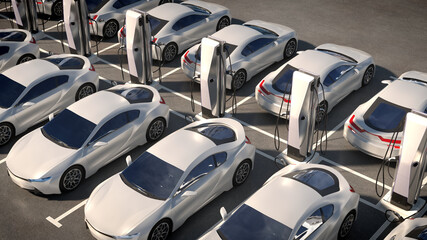The Exponential Growth of the Electric Vehicle Industry ⚡
(And Why We Need More Chargers to Support It)
There are very few industries that enjoy good faith and exponential growth the way the EV (electric vehicle) industry does. Sales nearly doubled in 2021 compared to 2020 (6.6 million vehicles, making up 9% of cars total). All of this is in the midst of supply chain issues and computer chip shortages, which makes this commitment on the buyer’s side even more impressive.
But why is that? How come this didn’t happen sooner?
Right now, we are experiencing a perfect storm of factors that turned electric vehicles into the hottest topic in the automotive industry, and we’re about to give you a brief outline of each one.
Better Than Ever: Variety and Performance
Tesla has been a behemoth in this space, but today, there is a wide variety of alternatives. Car manufacturers are now working around the clock to deliver the best electric vehicle they can. EV startups are popping up, and there are some murmurs that tech companies such as Apple and Sony want to enter the market.
Today, you can hardly keep track of exciting new vehicles set to release in the next couple of years. Electric-only lineups are becoming more common. This was not a thing in the past - of 20 new car models, 1 or 2 would be hybrid or electric.
It is safe to say that the competition has grown fierce.
“But what about the range?”
Electric cars can close double the distance with the same mass as they could a decade ago, and it’s all thanks to the energy density of EV batteries. Top-of-the-line electric batteries can reach upwards of 300 Wh/kg.
This means that we already have dozens of vehicles already claiming ranges that go well into 300 miles (482 kilometers). Bear in mind that there is another type of range that is more important, and that’s the real-world range. For example, if a manufacturer is claiming 380 miles (611 kilometers), because of environmental conditions, this could be 320 miles (514 kilometers). This is still an impressive figure, and it is to be expected that a car will expend more energy in harsh weather.
Good Faith: Public Awareness and Sustainability
People have become more aware of the benefits of electric vehicles. They emit no pollutants, so they are much better for the environment than gasoline-powered vehicles. They are also much cheaper to operate since you only need to charge them up rather than buy gasoline. And, as battery technology continues to improve, electric vehicles are only going to become more popular.
All of these talking points have become widely known and accepted.
“But What About Cobalt Mining in Africa?”
A prospective EV buyer is environmentally and socially conscious. We will be completely transparent and not sugarcoat this - the usage of cobalt and nickel in EV batteries has been a big red flag for prospective buyers.
However, innovation has taken a step in the right direction to solve this problem. There is a new type of cathode that requires no nickel or cobalt, the LFP (lithium iron phosphonate). Car companies are embracing it because of its great performance and no reliance on volatile commodities. This cathode has doubled in market share since last year.
Another upcoming technology is the sodium-ion battery which the world’s biggest battery manufacturer is testing. Sodium is cheap, and these batteries are nonflammable, energy-dense, and operate well in winter conditions.






It’s fascinating to see how the electric vehicle industry continues to thrive despite challenges like supply chain issues. As more people embrace EVs, the demand for accessible charging solutions is also increasing. A reliable charger for electric vehicles will be crucial in supporting this growth and encouraging more drivers to make the switch.
ReplyDeleteCharging an EV at a destination is not only convenient but also vital for supporting electric mobility. It ensures drivers can top up their vehicles while shopping, dining, or staying overnight, eliminating range concerns. Many destinations now offer reliable ev charging points near me, promoting eco-friendly travel and attracting environmentally conscious visitors. Installing charging stations at popular spots can boost business and encourage sustainable practices. Accessible and well-placed EV chargers are key to making electric vehicles a practical choice for all journeys. Learn more at El Monde.
ReplyDeleteAre you unsure what kind of charger you need? That’s where we come in. At The EV Man, we offer comprehensive consultation and expert advice. We work closely with you to assess your current electrical system, property layout, and daily driving habits. Electric Car Chargers Victoria
ReplyDelete